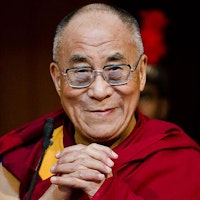Compassion in Action
Topic: Love, Compassion, & Kindness
I consider nonviolence to be compassion in action. It is not a mere absence of violence. It is something more positive, more meaningful than that. Some people seem to think that compassion is just a passive emotional response, rather than a rational stimulus to action. But to experience genuine compassion is to develop a feeling of closeness to others, as Mahatma Gandhi did, combined with a sense of responsibility for their welfare. His [Gandhi’s] great achievement was to show through his own example that nonviolence can be implemented effectively not only in the political arena but also in our day-to-day life.
Tenzin Gyatso, born on July 6, 1935, is known globally as the 14th Dalai Lama, the spiritual and former political leader of the Tibetan people. Born as Lhamo Thondup in a farming family in Taktser, Amdo, Tibet, he was recognized as the reincarnation of the 13th Dalai Lama, Thubten Gyatso, when he was just two years old. As the Dalai Lama, he holds the highest spiritual position within Tibetan Buddhism and is seen as a figure of great moral authority and influence. Following China's invasion of Tibet in 1950, he assumed full political power in 1950 but was forced into exile in India in 1959 after the failed Tibetan uprising against Chinese rule.
The Dalai Lama is renowned for his messages of peace, non-violence, inter-religious understanding, and compassion. He has authored numerous books and has lectured worldwide, becoming one of the most influential figures in the world of spirituality and philosophy. In recognition of his work for peace and non-violence, he was awarded the Nobel Peace Prize in 1989. Furthermore, his advocacy for the cultural and religious rights of the Tibetan people and his efforts to find a peaceful solution to the situation in Tibet through dialogue and understanding, rather than violence, have made him an internationally respected leader. Despite the political controversies and challenges, he remains committed to promoting human values and harmony among the world's religious traditions.
Gyatso, Tenzin. The Fourteenth Dalai Lama, speaking at International Charter for Compassion's Festival of Faiths, Louisville, Kentucky - May, 2013.

The Dalai Lama
Theme: Compassion


About This Dalai Lama Quotation [Brief Commentary]
His Holiness the Dalai Lama defines nonviolence as “compassion in action,” emphasizing that it is “not a mere absence of violence.” This phrase reframes nonviolence as an active and deliberate way of relating to others, rooted in a deep sense of care. Rather than being passive or reactive, nonviolence is “more positive, more meaningful” and requires a conscious choice to respond to suffering with responsibility. When compassion is genuine, it creates “a feeling of closeness to others,” which, in turn, leads to action. This closeness is not sentimental but grounded in empathy and ethical concern.
The Dalai Lama challenges the idea that compassion is “just a passive emotional response.” Instead, he describes it as “a rational stimulus to action.” This redefinition places compassion at the center of moral life—not as a feeling to be admired, but as a capacity that moves us toward responsible engagement. He points to Mahatma Gandhi as someone who exemplified this principle, showing that nonviolence can be practiced “not only in the political arena but also in our day-to-day life.” In this view, compassion is not limited to extraordinary moments but is relevant to ordinary human interaction.
By describing nonviolence as “compassion in action,” the Dalai Lama offers a clear path rooted in inner intention. He notes that “if you have hatred in your heart, then very often your actions will be violent,” while compassion naturally gives rise to nonviolence. This teaching calls for inner discipline and a commitment to cultivating compassion. Nonviolence, then, is not simply about restraint but about choosing to act from a place of connection and care. Through this lens, each moment becomes an opportunity to respond to the world with greater understanding and concern for the well-being of others.
Additional Dalai Lama Quotations
Related Quotes
Copyright © 2017 – 2026 LuminaryQuotes.com About Us